More on DST
Some interesting maps on the implications of DST v. standard time.
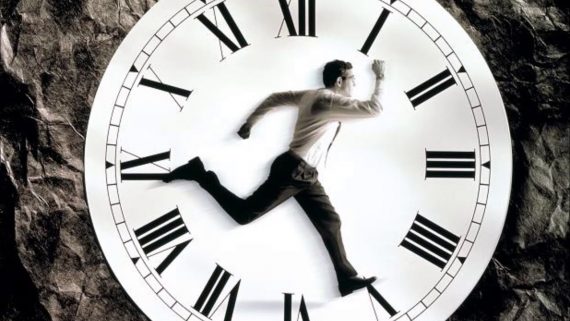
James Joyner beat me to the story about the unusual passage of permanent DST in the Senate, but I will repeat what I noted in the comments: I knew something didn’t quite track when I read that the bill had so easily passed in the Senate. At a minimum, the notion that the bill would likewise sail through the House (if it even made out of committee and then onto the floor) seemed remote. This kind of change is not as simple as this rapid-fire legislative trick suggests.
At any rate, I wanted to add in this from Vox: The Senate just voted to make daylight saving time permanent. Good. The piece provides a good backgrounder on the general subject, but most significantly, provides the best data visualizations of the subject that I have seen:
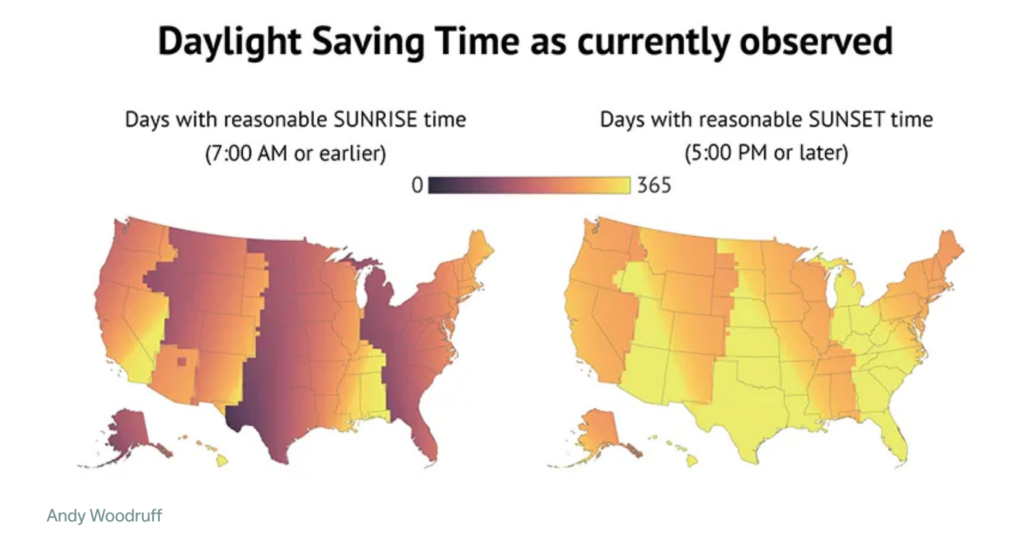
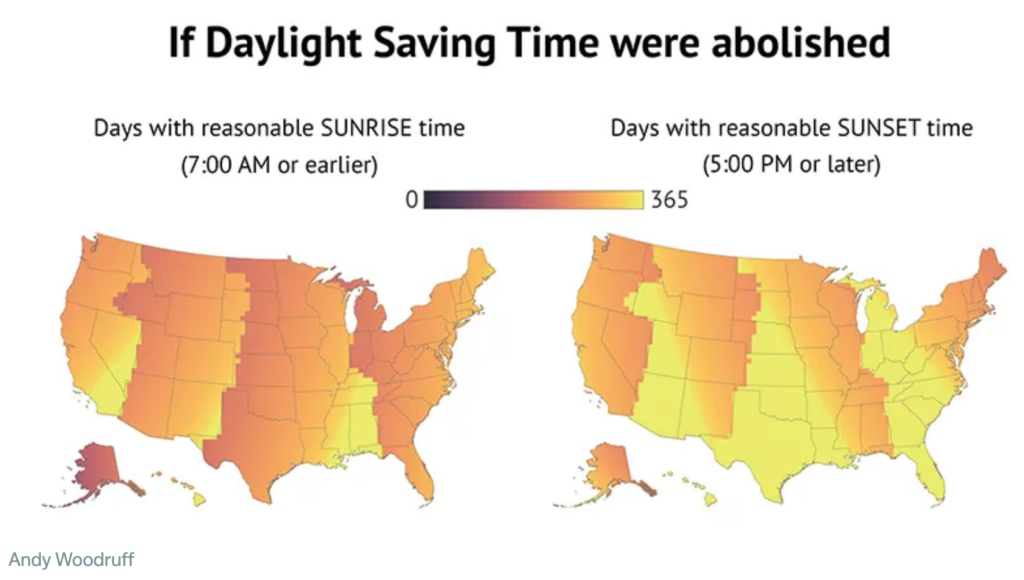
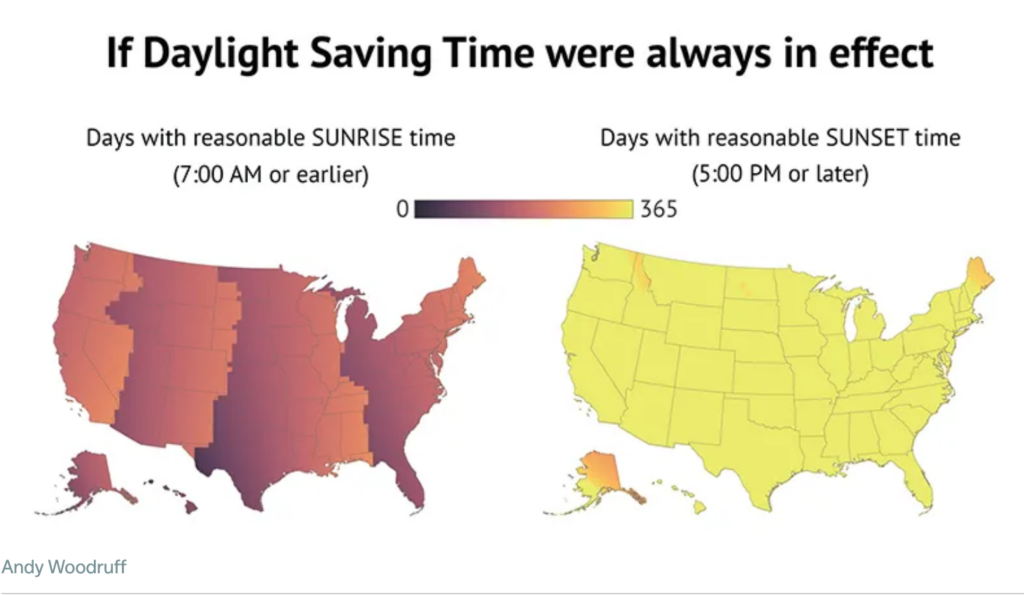
Clearly, it boils down to where one lives and one’s personal preferences. Further, the main issue of contention is the morning, as everyone gets a better sunset situation with DST.
I will say this: I wish we would just pick one and done with it, given that the change really does require a physical and mental reset twice a year.
As the article notes:
In the days after daylight saving time starts, our biological clocks are a little bit off. It’s like the whole country has been given an hour of jet lag.
One hour of lost sleep sounds like a small change, but we humans are fragile, sensitive animals. Jet lag can mess with our metabolism; extreme versions of it can contribute to diabetes or obesity. But in the short term, jet lag dulls our mental edge.
And when our biological clocks are off, everything about us is out of sync. Our bodies run this tight schedule to try to keep up with our actions. Since we usually eat a meal after waking up, we produce the most insulin in the morning. We’re primed to metabolize breakfast before even taking a bite. It’s more efficient that way.
So, while based one where I live I do not have a strong opinion on which would be better, I am on Team Consistency.

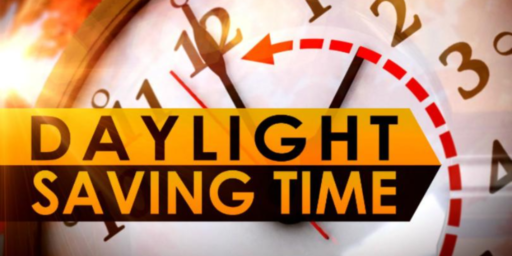

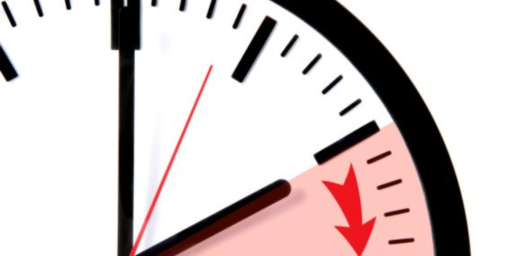
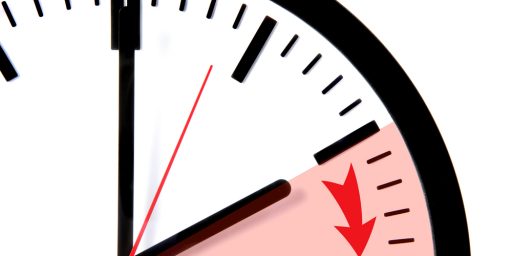

It’s going to be bad for surfers in the northeast. The best waves tend to be from October to March. And if you want to surf and have a normal job/life, you’re going to be out at dawn. The extra hour is crucial. Really not sure why Congress is not taking our needs into consideration.
These maps illustrate the point I was trying to make a few weeks ago. We have this national fixation that the clock timesets our starting times. Nothing could be further from the truth! Every company, school district, and governmental agency sets their own starting and ending times and are perfectly free to adjust them based on any criteria they choose. This doesn’t require a change to the clock! The Federal government should absolutely not be complicating these local factors by dictating a change of clock time twice a year.
Well that’s stupid. They should just keep sunset late and make sunrise earlier. (I’m practicing being a MAGAt in case Republicans make it necessary to appear to fit in.) More seriously, I agree. Pick one, either one, I don’t care which. The only thing dumber than DST is changing twice a year. And Rubio and Synema figured out this trick to sneak a bill through the Senate and wasted it on this? We could’ve had Medicare for all.
@Modulo Myself:
Oh, thanks, pal. Now “Surfin’ U.S.A.” is going to be my earworm for the day.
Thanks for this. I now understand my own position (permanent DST) much better. Most people arguing over this seem most interested in what happens in the morning. I don’t care much about the front end of the day, but I dislike coming home in the dark, and I have a really hard time during the part of the year when it is only light out when I’m at work. It feels like I never even see the sun. So that bright yellow final map looks quite attractive to me.
I spent quite a number of years living on the eastern end of the Central Time Zone, which was just terrible in that our clocks were an hour out of phase with the sun on a more-or-less permanent basis. Clearly, the current setup is the worst: not only do we have to get used to a time change twice a year, but the visualization also makes clear it’s worse than permanent Standard Time. Even though I’m a very early riser, I’m willing to trade off darker mornings for more evening daylight. But I can see why others would disagree.
@Erik: I’m with you. I retired to the FL Gulf coast because the Atlantic coast has great sunrises, the Gulf sunsets. And I’m retired, I don’t do sunrises.
The obvious answer is to move from the 24 hour day to the 26 hour day, resulting in an extra hour at both sunrise and sunset.
Jeez, can’t believe no one’s ever thought of this.
Liberté, Egalité, Fraternité!
(and decimal time)
In this new era of globalization and worldwide companies, my preference would be to not only do away with DST changes, but to do away with time zones altogether.
Let’s just decide, as a globe, how we are going to label the time and be done with it. I’m happy to use UTC if that works for y’all.
This idea that every place in the world needs to be in full daylight at the hour described as 1300, combined with the various countries/states/counties that change the definition of time periodically, creates unnecessary complexity. Hell, some countries don’t even have full-hour time zones, but rather are off by 1/2 hour from adjoining places.
Something needs to be done!
An earlier sunrise would be preferable from a physiological standpoint.
The human body responds to sunlight, not to the knowledge that it’s time to get up and go to work.
@Michael Reynolds:
Well, my idea to tilt the Earth’s axis surely has problems. We could slow down the Earth’s rotation, though. After all, it’s already slowing down, as momentum gets transferred to the Moon, which then moves a bit farther away.
And bringing in a large satellite from one of the gas giants to do so, would only make the colonization of the Moon, Mars, the asteroids, and the satellites of one gas giant planet go faster.
All in favor say “aye.”
The cheaper option is to roof over all cities and go with artificial sunlight at even 12 hours daytime and 12 hours nighttime every day. Plus the whole world would be on one time zone (except Arizona for some reason).
@Modulo Myself:
Because they’re aren’t enough of you out there to pool together a decent
bribePAC contribution?[…]
ETA: What I really want to know is who was put in charge of deciding that 7 am was the correct sunrise time? That’s waaaaayyyyy too late!
EETA: “We could’ve had Medicare for all.”
Not with Rubio and Simema deciding on the bill, no. 🙁
EEETA: @CSK: “Now “Surfin’ U.S.A.” is going to be my earworm for the day.” But it wouldn’t have happened to ME if you handn’t mentioned it. 🙁 Thanks for nothing! :-X-
@Just nutha ignint cracker:
Growing up I wondered why the day began in the middle of the night, 12:00 am, rather than with sunrise. A good enough but not good answer is that the sun rises at different times depending on latitude. But it still would make more sense to me if the day began around sunrise at the equator.
The other big temporal question I had is why the year starts in the middle of winter rather than at the beginning of spring or close to it.
Here history provides an answer. In Rome, the year began on March 1st, which is close to Spring in the Mediterranean region. This was later changed to January 1st, but I’m not clear why or by whom. All I know is that it happened in Rome’s Christian era.
@Tony W: Hear! Hear!
The people who whine about this every year are mostly the same people who willingly get on a plane to change 3+ timezones back and forth over a week or two.
But since we no longer need the early sunrise to let the factories get to work, all that needs to be done is to change the start of schools so that the kids are out on the side of the road in the dark. What’s not shown is if the shift is to abandon standard timezones and move one zone earlier, when would school start if kids weren’t bused in till after sunrise in winter, 9 am? 10 am?
Need a map showing with daylight savings time year round how many days with a sunrise before 9 am. The northern tier of state would not be happy.
I found the WAPO’s map to be pretty useful.
I suspect that I am the only person in the world who is in favour of the changing of the time – in the winter is better to have the “natural” time (to wake up with sun, instead of going to work or to school during the night), and in the summer the DST (to have an additional hour to go to the beach of give a walk after work).
And I can’t understand what is the problem that, apparently, almost everybody seems to have with changing the clocks; yes, I understand that most people don’t like the first weeks after the change from DST to normal time, where (at least in Portugal) in one week it is day when your workday ends, and already night in the next week (instead of a gradual change); but I never saw any protests against the opposite (when time changes from normal to DST), then I suspect that real problem for most people is not the change of time, it is really the darkness (who is more a problem of the axis earth than of the time system).
And it is consistent with the most popular idea being “permanent DST instead” of “permanent solar time” – this mean that what most people ara against is the winter, not the changing of the time
I like to to be reminded to check the batteries on my smoke detector and my carbon monoxide monitor.
If you cannot handle a one hour shift twice a year, just whine to someone else. I don’t care.
The purpose of DST is to align sunshine to normal waking and working hours. Specifically, for the morning. Having the sunrise at 5:30 AM while having the workday start at 8 is just grossly inefficient. Having sunrise at 9AM is just as inefficient.
You cannot legislate away the axis of the earth. You cannot legislate extra hours of daylight. The axis and the orbit are facts.
I am old enough to remember the 1974-75 experiment. It sucked. Everyone hated it. Begged for for the status quo ante.